02/19/2018
Clevelanders Volunteer in Beit Shean
- Share This Story
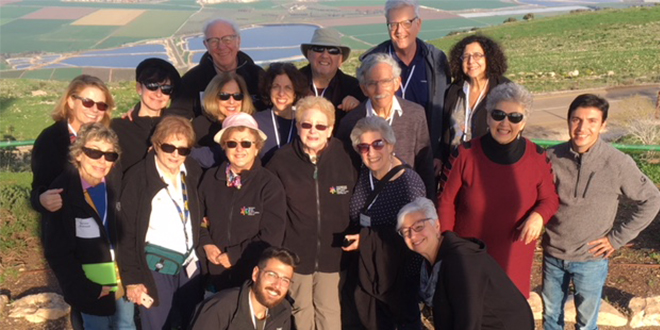
With Volunteer Beit Shean, Jewish Clevelanders are immersing themselves in Israeli life while volunteering in Beit Shean/Valley of Springs, Cleveland’s sister city in Israel. They're helping the people of Beit Shean with daily hands-on volunteer opportunities, enjoying home hospitality, and visiting the city’s historic sites. Read their travel blog now!
Tuesday, February 13
by Steve Friedman
My assignment was to write about our first day in Beit Shean, which consisted of an early evening bus ride from Ben-Gurion Airport to Beit Shean and a 'get to know each other' meal at Rozalya. I wish I knew then at that first meeting what I know now, seven days into our trip – what a warm, funny, considerate group we are and how significant and emotional our time in Israel is for many of us. At a group meeting we had after Shabbat ,one woman said she wished she had moved here years ago; another said, through her tears, she felt like she was home.
This trip is extraordinarily well planned and executed. I told Efi, Ziv, Avigail, and Dorit, our guides to the community, that since the start of this trip they have hit one home run after another – no singles or doubles, certainly no strikes – just home runs.
This week has been an immersion in Beit Shean past, present and future. Beit Shean's past is extraordinary. It was a crucial stop on various trade routes and the site of a magnificent National Park that is an excavation of a major ancient Roman city. To use a hackneyed phrase, the first sight of it, even in pretty heavy rain, was breathtaking. The city was destroyed by an earthquake in 749 C.E.
Since our trip began we hear the same theme arise spontaneously from all the people we meet – about the value of family and community and the superior quality of life in Beit Shean and the Valley of Springs.
Four of us chose the archaeology track. Our dig is an ongoing excavation of an ancient synagogue on the edge of a field growing tomatoes that will be made into ketchup. The teens I worked with are the best ambassadors for the Partnership – fun to be around, eager to teach me their favorite songs and to help me learn Hebrew, and hard workers. And they ask me the best and most direct questions: "What do you think of Israel? Will you come back?"
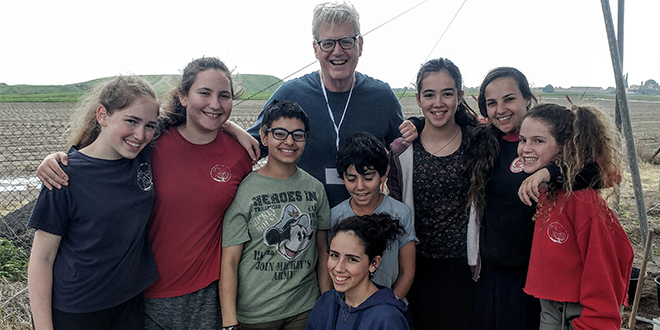
Wednesday, February 14
by Lenny Tracht
Today we had orientation sessions describing our role and activities while visiting Beit Shean. We had a delightful lunch at the facility headquarters. My impression is of total commitment by the staff to our participation and comfort in this trip. The breathtaking view from the top of the Gilboa mountain was so spectacular. Later in the day we all learned about Israeli culture in an informal meeting. Our group is sharing and bonding nicely especially at meal times.
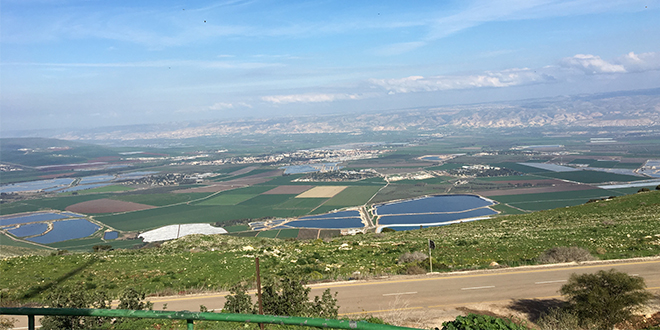
Thursday, February 15
by Linda Whitman
Oy, I just tracked mud into my room! I say mud because “dirt” is what is under your bed (at least that’s what I tell my students). And I am tired. Today was the first day of volunteering. Loree, Steve, Regina and I volunteered on the archaeology tract. It was cool and windy when we got to the site where we met archaeologist Achiya Cohen Tavor. I was excited and a little anxious. Even though I am an archaeologist, things are done differently all over the world.
We were able to excavate for an hour before the 8th and 9th grade students from Geon Hayarden arrived. This allowed us to learn Israeli excavation techniques as well as the different types of artifacts we would encounter such as pottery from different time periods, mosaic tiles, glass, etc.
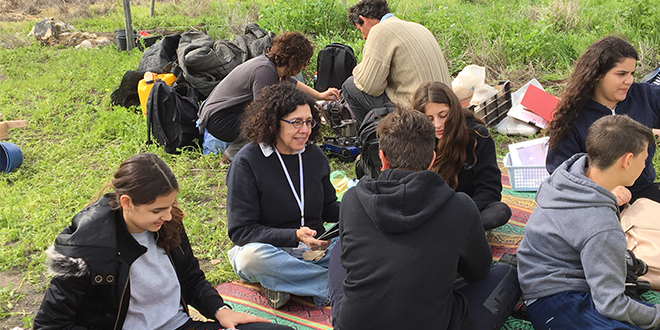
Once the students arrived, we broke into four groups and went to work in our excavation unit. My four students spoke English quite well and were chatty but I found that I asked most of the questions. I guess I was expecting the opposite. We talked about family, siblings, pets, school, sports and after school activities. But mostly they were interested in finding stuff and I cannot blame them. It was all very exciting.
After lunch, we visited Eden Farm, an agricultural research station where Zion Daco explained the fascinating research they and students conduct. We toured several greenhouses, tasting amazing tomatoes and peppers, and saw beautiful eggplants, pineapples, and strawberries. We learned how they use tufa or volcanic material to enhance the soil and how growing vertically produced more delicious vegetables. As Zion stated, “We don’t have problems in Israel. We solve them.”
That evening several of us ate Tunisian cuisine prepared at the home of mevashlot Michal Dayan. And we helped prepare one of the zillion amazing courses that we ate.
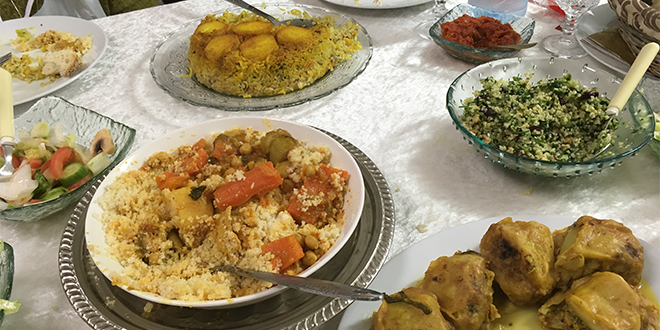
Friday, February 16
by Beryl Burko
So many thoughts, impressions and emotional responses today – it is difficult to know where to begin. Here are just a few:
My first Shabbat in Israel – the whole country “changes gears” to prepare for the coming Shabbat. In Beit Shean, the children have only a half day of school. They will resume school on Sunday all day. While this may be startling to us from the USA, it is to them the rhythm of their lives.
We toured one of the last traditional Kibbutzim, Kibbutz Sde-Eliyahu. This Kibbutz still adheres to socialism, wherein all residents work for the common good of the whole. No one gets a salary for his/her work, only an allowance and everything is shared equally. We were toured by Sarah Goldsmith, who has been here for many years with her family. The majority of Kibbutzim, are now “privatized,” meaning the residents work for a salary that they can spend or save or do with as they please. They also do not have communal dining rooms where everyone eats together.
We Jews in America are so used to thinking of the Kibbutz concept as it originated. In our minds Israel and Kibbutz are synonymous with oneness of purpose – the survival of Jewish identity through communal dedication and hard work together. While modern Kibbutzim still, of course, adhere to these goals, it is a little difficult, I must admit, for me to rethink the Kibbutz concept as more of a gated capitalistic community.
To earn our pre-Shabbat day, we were all assigned a private home to visit for Shabbat dinner. Another volunteer and I received the warmest welcome from the family and extended family of Racheli Ainhorn. The women lit the Shabbat candles and then we sat down to the most delicious dinner.
Sitting around the table together reminded me how connected we Jews are no matter what countries or distance separates us. I could have just as easily been at my own family table, so similar was the feelings of peace, comfort and love for each other.
It was a lovely day to be remembered and cherished.
Saturday, February 17
by Bethany Chos
Beit Shean National Park was quite interesting to say the least! I was thrilled to see the ancient structures and natural features of the park, complete with an old Roman Colosseum! Rain was a bit of an inconvenience but for the region it is what they prayed for and we mustered through with raincoats and umbrellas. The mountain replete with 150 or so steps looked amazing but would have been terrifying on the way down.
Food was abundant and delicious as usual! It was a feel-good event to make treats for the soldiers. Free time today was a welcomed chance to rest up and get things done. Having a blast! It's nice to have a real Shabbat today to reflect and renew!
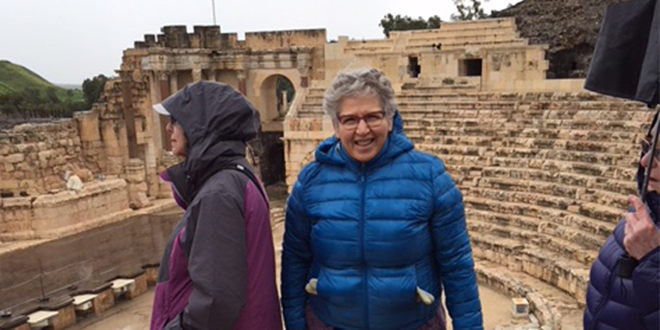
Sunday, February 18
by Regina Dorman
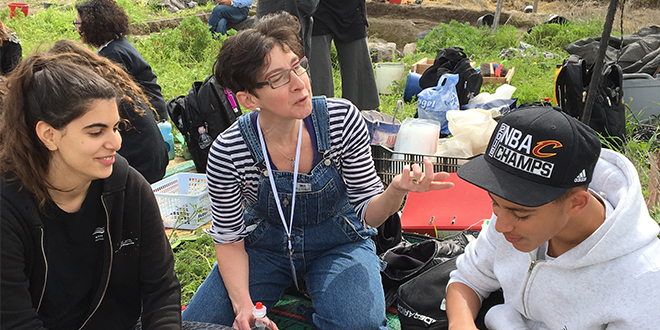
Perhaps you love waking up at five in the morning on a February Sunday. But I am sure that these boys and girls do not appreciate such opportunity….
We are standing at a local bus stop; on the portable table, there are dozens of Mishloach Manot filled with chocolates, fruit, and bottles of water. We are excitedly waiting for our Israel Defense Forces (IDF) soldiers to get “unloaded” here by their parents at the dawn hours of the windy winter day. How super-excited our group is to see the soldiers off to service, hug them, chat with them a little and finally give them the tasty treats. Many of us are teary-eyed. Yet, the kids in uniform keep their cool, and we hold ourselves together.
There isn’t much time to spend with them but from bits and pieces we learn that one of the hardest things was to run 24 kilometers with 10 kilos of ammunition, at the speed of 7 km/hour and the start of the run at 9 pm after a full day that had begun at 5 am. That one of the girls has been in the army for just a week but manages to smile despite being "sooo homesick." That two boys, Israeli natives, whose parents had moved, have actually joined six months ago from the States, because they felt it was their call.
Five minutes later, a young mother with the beautiful head of dreadlocks, drops off her kid-looking daughter in the khaki uniform. Mother waves good-bye to her princess and takes off. The girl takes a breath, fixes her royal blue designer purse and settles for the cup of coffee – she drinks it listening to the music from her headphones and stomping her feet in the massive military boots…
It is cold. Several local women are in charge of Michloach Manot. We’re just helping out, but the experience is so meaningful. All in all, it’s our children that are returning to the army base to continue defending the Holy Land. We pray that they are safe and healthy, and quietly mumble “Shema Israel.”
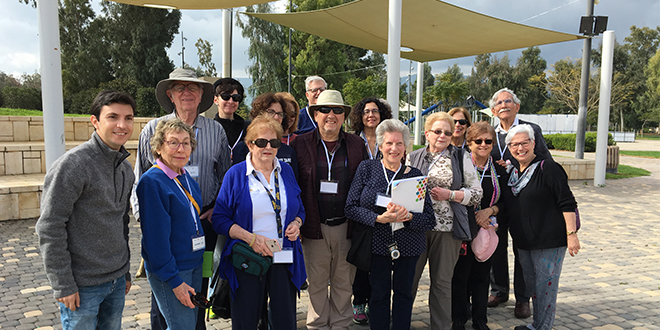
The day continues to be emotionally charged by a nest of loud, funny, smart, beautiful Jewish teenage girls – we visit religious school at the Kibbutz Sde Eliyahu. They talk our ears off, laugh, dance, giggle, tell us that they love Justin Bieber and, at least once, rode a camel.
We want to dance with them, too, but there are more activities in today’s package. And off we go to the Valley of Springs, where we see a memorial trail in honor of the 28 year old IDF officer Tzvika Kaplan, the crystal transparency of water, green houses, and the fields of wheat…The face of Israel.
We talk about Judaism, partnership, peace, children, and, like Jews always do, we try to find a solution “right here right now.” There is none now, but may be today has brought us just one step closer.
Monday, February 19
by Loree Potash
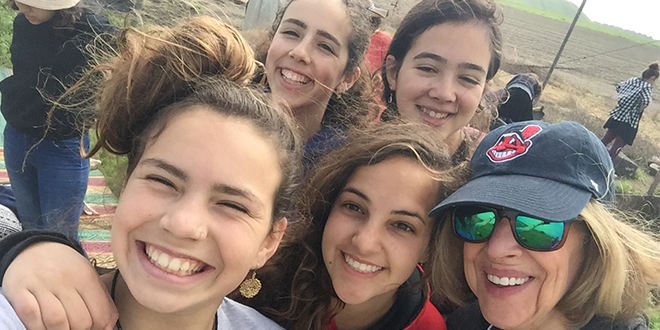
Our first week is completed. Our day starts with a traditional Israeli breakfast in the hotel and volunteering in the morning. On Monday afternoon we visited Idan Technology, a maker space that is a public/private project between the valley of the springs and Gevasol Corporation. We had dinner with the volunteers from Masa Israel Teaching Fellows, post college young adults here for a year to tutor English.
I am in the archeology track with four others. I return to my Guest House room dirty, tired, and amazed at the energy and curiosity of the students.
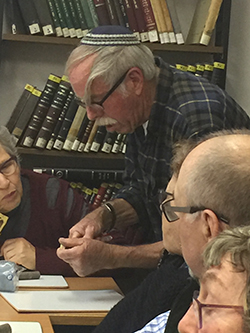
The classrooms in Beit Shean are very different from the US. Boisterous, hectic, informal. It is a wonder teachers can teach anything. The students I met at the dig are engaged with their work and most are struggling to learn English. They teach us Hebrew words and songs while we encourage them to speak English.
The Beit Shean community is warm and supportive of us. We have been to dinners at resident’s homes and volunteered together. I feel grateful that I am here. Fifteen diverse people in our cohort have bonded in our sister city through doing chesed. I lost a friend on Saturday and the group provided me much support as I came to terms with his death. I am overwhelmed by the experience here. I think I will need time at home to review and remember all that we have done.
Tuesday, February 20
by Joan Shall
Israel, a lifelong dream and was now a reality for me. From the moment we gathered at the Kakoa Coffee shop at Ben-Gurion Airport, I felt at home. I was just a Jew in my Homeland and it felt great!
I had chosen the Education track, which meant I would spend my mornings working with 4-6 graders at the Dekalim Elementary School in the Valley of the Springs. I had limited Hebrew skills of my own so I was a little nervous. With the help of my daughter who teaches in a Jewish Preschool in Charlotte, NC, I created a “Flat Stanley-esque” project. For those not familiar, Flat Stanley is a beloved children’s book about a boy who gets flattened and then travels the world. I came equipped with a flag made by her Pre-K students and a list of their questions for the Israeli students. It was an immediate icebreaker. The 5 year olds in Charlotte wanted to know all sorts of things.....Did they have squirrels? What did their houses look like? Did they have playgrounds? Swimming pools? What were their favorite foods? The Israeli kids eagerly answered the questions and posed questions of their own that evolved into little conversations. I provided the kids in Charlotte with answers to their questions and photos of the Dekalim students in action. Jewish kids in Israel where connecting with a class of little buddies in the U.S.!
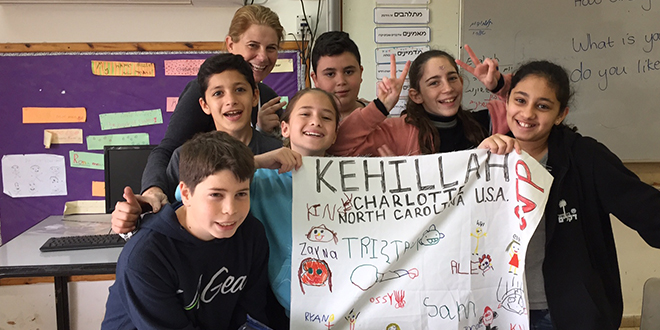
Our English practice continued with games like Telephone, Memory, and “Joan Says” (formerly known as Simon Says) completely with giggles. And my kids were eager to teach me Hebrew at every opportunity. By the end of our time, even the shyest students were greeting us loudly and proudly in English! I’m not sure who benefited the most, me or the students.
Our afternoons were packed with opportunities to learn about the area and its remarkable people. Visits to Kibbutzim, archaeological sites, Eden Farm, as well as warm home hospitality gave us a view of life in Beit Shean and the Valley of Springs. We quickly discovered how little we knew about the many Jewish cultures represented in the area. Tunisian, Kurdish, Iraqi, Egyptian, and Afghani Jews, each with their story, foods, and traditions opened new worlds. An exotic woven tapestry of cultures, with the common thread of Judaism.
The Partnership staff in Beit Shean was truly remarkable. I can’t say enough about Efi, Avigail, and especially Ziv. They were hands on with us every day, and in the case of Ziv 24/7. Flexible and resourceful, Ziv guided us through an adventure of a lifetime.
Wednesday, February 21
by Harriet Friedman
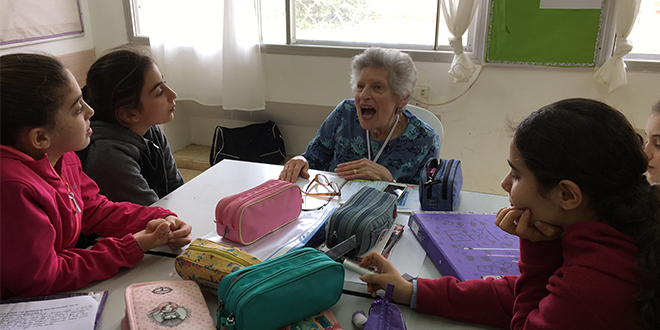
Our time in Beit Shean and the Valley of Springs is coming to an end. As the students of Dekalim School prepare for a joyful Purim, I am sad to complete our work and leave the area.
Had it not been for this program I’m not sure I would have visited the area, which is lovely at this time of year. I was delighted that in addition to the warm reception we got at the school, we were introduced to people who are doing remarkable things in agriculture, and we met individuals who have benefited from Partnership programs and are giving back to their communities. Everyone was so warm and welcoming. I wish I’d learned more about children and their mentors in the Youth Futures program and I was gratified to hear about groups that have come as immigrants over the course of decades.
The staff that planned for our trip and supported us every step of the way, Efi, Dorit, Avigail, and especially Ziv who lived with us, deserve gold stars.
Volunteer Beit Shean was an exhilarating program in which we tried to give something and from which we received so much.
Thursday, February 22
by Judy Friedman
The last day brought another emotional day. There were lots of smiles, tears, hugs, compliments, praises, thank-yous, and more hugs.
This day was for the volunteers and staff. After filling out an evaluation form of the many aspects of the program and giving our reactions to the experience, we each had a chance to share our personal perspective and reflections. Naturally there were tears as we expressed our thanks, appreciation, and well-deserved praises to our hardworking and devoted staff. We agreed that our wonderful experiences far surpassed our expectations and that we got more from our experience than we gave. The staff also had an opportunity to share their thoughts with the volunteers.
Our next stop was for lunch at the beautiful kibbutz Nir David. We admired the lush green landscaping of this lovely kibbutz.
Our final stop was to Havat Hashomer. We noticed soldiers enjoying the sun as we headed to a large formal conference room with very comfortable chairs. There we had an opportunity to hear an overview and description of this unique place. The head commander, followed by two female commanders, helped us understand the need and significance of this extraordinary pre-army experience. The soldiers, about 1,000 men, come from various at-risk backgrounds. Because of their troubled past, these soldiers need an extra six months of training in order to learn how to get along and fit into the army after this special valuable experience. At Havat Hashomer they receive military training, develop their identity and sense of empowerment, and gain a feeling of belonging. The young female commanders explained that their own fulfillment comes from the fact that they don't give up on these soldiers and convince the soldiers that they can succeed.
It's hard to say goodbye to such a terrific group of people, but we agree to do our best to continue our friendship with each other and with our new friends at Beit Shean and the Valley of Springs.
Additional Reflections
by Jack Becker
After the WWII my meshpocha (family) Moldavski was returning to City of Kishinev, Moldova. Women – from evacuation to Kazakhstan, men – from fighting Nazi’s in the war.
About 20 family members settled in one room on Balanovsky Street, where I was born a few years later.
One fine day in 1951 my grandma Udl, her two sons and four daughters, their spouses and us, kids, gathered for a photo session. On the old picture I’m on the bottom row, third from right.
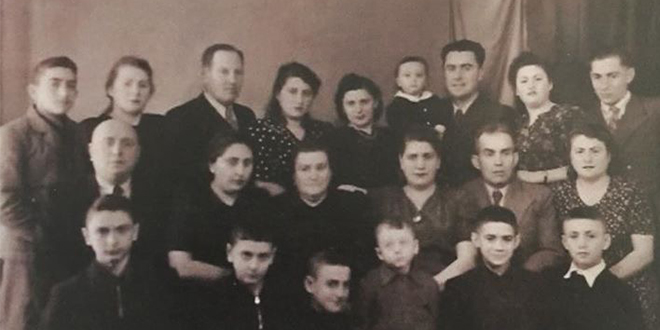
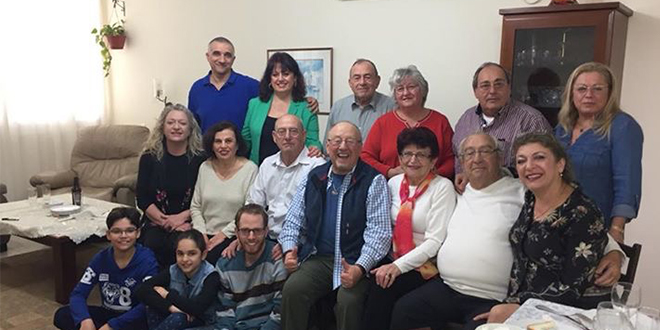
Sixty seven years later, on February 10, 5 first-cousins met in Rehovot for an unforgettable reunion. Conversations, songs, food and tears of joy...
On my trip, the first volunteering day is behind us. At an Educational Garden, we met a smiling worker emigrant from Ethiopia, and enthusiastic 5th graders of the local school.
Our great guide Efi tells us the story about a famous citizen of Beit Shean, slave, gladiator, thief, and, finally, Rabbi Rish Lakish, who said: If there is paradise – than Beit Shean is the gate of it.
This is my fifth trip to the land of Abraham, Izchak, and Jacob, and it is a sweet homecoming for me.
From Cleveland, where my wife Zina and family are waiting for me, to Beit Shean, located 10 kilometers from Jordan’s border: Hello Israel – my home away from home.
by Jane Edelstein
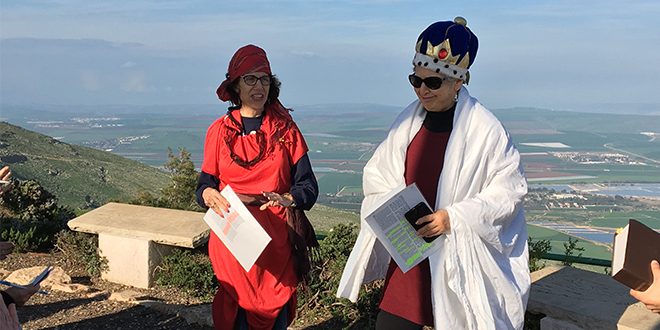
Our 15-person group in Beit Shean is enjoying our volunteer work, seeing much of the city and the Valley of Springs, and tasting food at just about every restaurant in town. But how do we know that we’re bonding as a group? Here are seven hints:
- When Loree Potash heard about the death of a close friend in Florida, there were plenty of hugs to go around;
- When Steve got a bit of a tummy ache, he was offered Imodium by multiple women. Unfortunately, the Imodium that Steve took was actually an antihistamine. (Steve recovered in spite of himself.)
- When more than 20 types of salad were served at a restaurant dinner one night, it took a generous dose of group sharing to figure out what they all were.
- Multiple conversations take place daily about the hand-washing of underwear. Forget the age, gender, or shyness of any particular group member. Clean underwear conversations rule!
- Our incredibly wonderful tour coordinators—primarily Efi and Ziv—have ceased to become “others.” They are now part of us. Crazy Clevelanders.
- Frank, our Kid Magnet from Heaven, entertains the elementary school kids with funny faces, wiggling ears, quivering cheeks, plus who-knows-what else. The kids gather around him, entranced and unwilling to leave.
- A group personality emerges. We are all energetic and tired; religious and secular; learning and teaching at the same time. We want to give back to Beit Shean in a big, enduring way—like Art Naperstak did.
Overall, it’s wonderful—every minute of it. God had a plan.
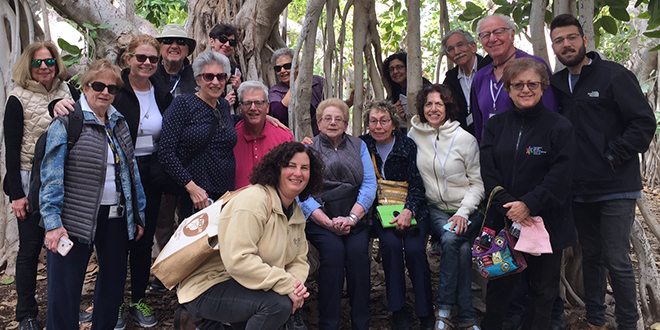


Comments